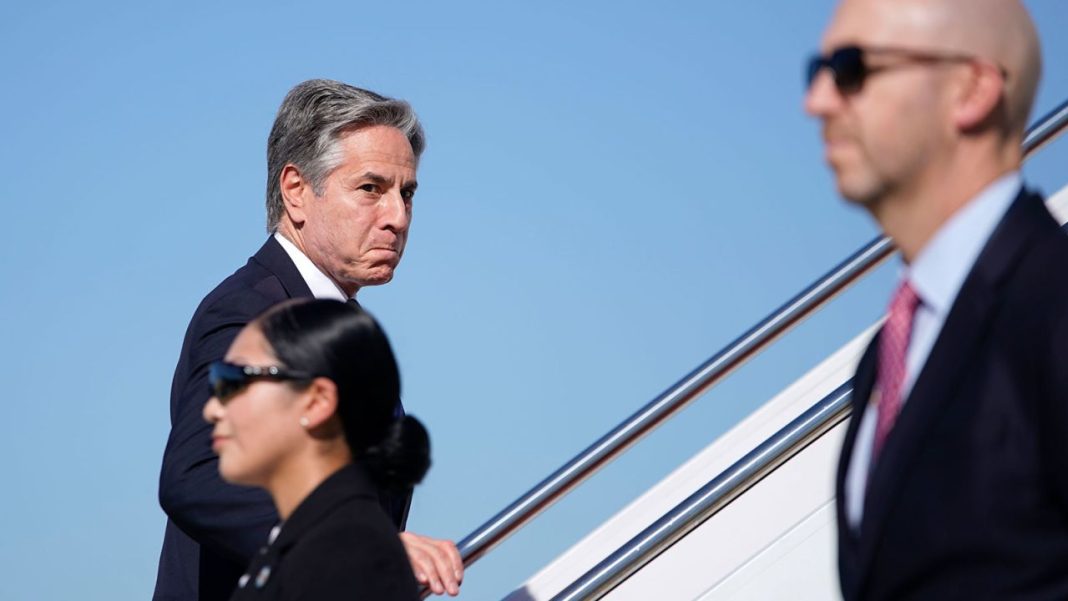Blinken arrived in Israel on Tuesday on his 11th visit to the Middle East since the war in Gaza began more than a year ago. It is his first trip to the region since Israel escalated its conflict with Hezbollah in Lebanon late last month.
The visit got off to an inauspicious start as Hezbollah launched medium-range missiles towards Tel Aviv, temporarily shutting down Ben Gurion Airport, where Blinken landed, according to Israeli media.
At the meeting in Jerusalem, the US official pressed Netanyahu to “capitalise” on Israel’s killing of Hamas leader Yahya Sinwar last week in order to bring the war in Gaza to an end.
Blinken “stressed the need to capitalise on Israel’s successful action to bring Yahya Sinwar to justice by securing the release of all hostages and ending the conflict in Gaza in a way that provides lasting security for Israelis and Palestinians alike”, US State Department spokesman Matthew Miller said after the talks.
Blinken also “emphasised the need for Israel to take additional steps to increase and sustain the flow of humanitarian assistance into Gaza and ensure that assistance reaches civilians throughout Gaza”, Miller added.
Netanyahu’s office announced Sinwar’s killing “may have a positive effect on the return of the hostages, the achievement of all the goals of the war, and the day after the war”.
But there was no mention of a possible ceasefire after a year of war in which Hamas’s military capabilities have been greatly degraded and Gaza largely reduced to rubble, with the vast majority of its 2.3 million Palestinian residents displaced.
One topic of discussion was the so-called Generals’ Plan. Put forward in September by retired General Giora Eiland, the Generals’ Plan – which calls for the expulsion of Palestinians from Northern Gaza and the forced starvation and targeting of whoever stays behind – has been labelled a roadmap to ethnic cleansing by critics.
An American official has stated that Netanyahu and his top aides sidestepped Blinken’s request during the meeting to publicly clarify that Israel is not seeking to lay siege to northern Gaza.
Netanyahu and Strategic Affairs Minister Ron Dermer insisted during the meeting that Israel is not implementing the so-called General’s Plan aimed at isolating northern Gaza and argued that claims to the contrary have been detrimental to Israel’s public image, the US official said.
Blinken urged Netanyahu to clarify this publicly, but he and his aides demurred, the official added.
The US State Department noted Blinken and Netanyahu also discussed ways of implementing a long stagnant 2006 United Nations resolution passed after the last Israel-Hezbollah war that would restore security and calm along the Israel-Lebanon border and allow civilians on both sides to return home.
But as Blinken met Israeli leaders, Hezbollah ruled out entering negotiations with Israel while fighting continues, and it claimed responsibility for a drone attack targeting Netanyahu’s holiday home on Saturday.
In his statement, Netanyahu also stated a need for change in the security and political situation in Lebanon that would allow Israelis to return safely to their homes that had come under Hezbollah rocket fire.
Israel’s conflict with the Iran-linked armed group Hezbollah in Lebanon has intensified in recent weeks after a year of cross-border fighting.
Early on Tuesday, Hezbollah said it had launched volleys of rockets at two Israeli military bases near Tel Aviv as well as a naval base in Haifa.
The backdrop of violence to Blinken’s visit serves to illustrate the sparse hope that his visit will result in a breakthrough.
Speaking to reporters on his way from Tel Aviv to Saudi Arabia’s Riyadh on the next stage of his Middle East visit, Blinken stated that the US fully rejects the idea of Israel permanently occupying Gaza, and said that Netanyahu’s government have an opportunity to turn its military campaign against Hamas into “an enduring strategic success”.
“Now is the time to turn those successes into an enduring strategic success. And there are really two things left to do, get the hostages home and bring the war to an end with an understanding of what will follow,” he added.
Israel has achieved most of its strategic objectives in Gaza by destroying much of Hamas’ military capacity there, opening the door to a lasting end to the conflict, Blinken continued.
